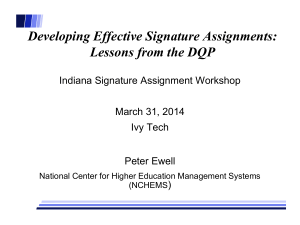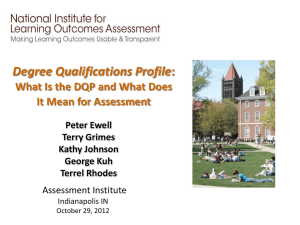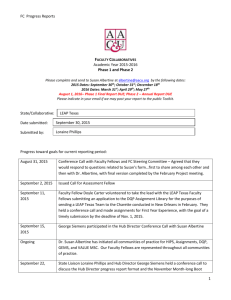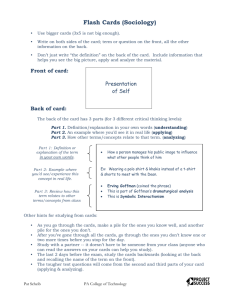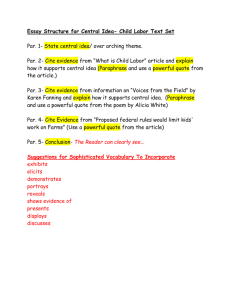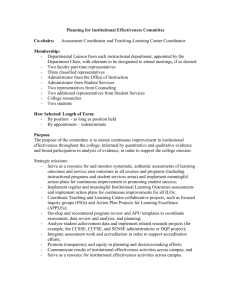Personnel Activity Reports (PARs)
advertisement
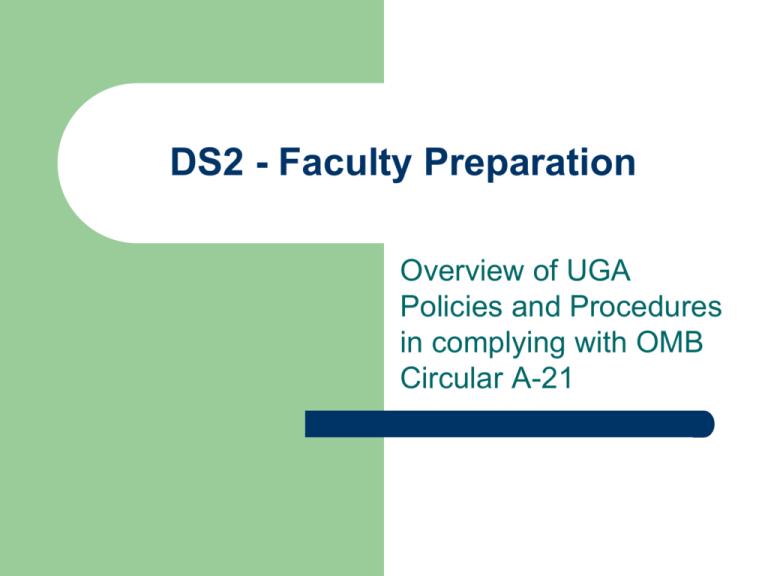
DS2 - Faculty Preparation Overview of UGA Policies and Procedures in complying with OMB Circular A-21 DS2 - General Information Disclosure Web Site: www.busfin.uga.edu/disclosure All Policies and Procedures related to the University Disclosure Statement may be found under the Disclosure Policies and Disclosure Procedure links Policies are effective January 1, 2006 Substantial Changes must be approved by our Cognizant Federal Agency DS2 - Meeting Agenda What is a DS2? How was the UGA DS2 developed? Policy and Procedures - overview Additional References Conclusion Questions What is a DS2? Documents and discloses University cost accounting practices Required to be submitted to cognizant agency and cognizant audit agency. Policies and procedures, instructions, and guidelines for individual investigators, department heads, and administrators need to be made available because it is their responsibility to understand and know them. Provides Guidelines for “charging costs to sponsored awards” Defines University direct costing policies and procedures Cost-sharing policies Time and effort reporting policies and procedures Policies on “Service Centers” DS2 – How was it Developed Three working group committees were formed comprised of College and Departmental Business Managers and Faculty representatives Steering Committee comprised of Associate/Assistant Deans, Department Head, and Center Director representatives DS2 - Policies New Policies – – – Cost Transfer Program Income Service Center Existing Policies – Revised – – – Cost Share Direct Cost Personnel Activity Report DS2 – New Policies Cost Transfers Cost Transfer – movement of expense(s) between two different university account numbers Charges should be moved within 90 days of initial charge Charges moved after 90 days require PI signature All transfers must have adequate explanation/justification No transfers allowed to a restricted account if expense is more than a year old DS2 – New Policies Cost Transfers Appropriate Justification Includes: – – – – When the error, or need for a transfer was discovered What the charge was for Why the charge was identified with a different project originally How the charge relates to the project that it is being transferred to DS2 – New Policies Cost Transfers Conditions for not Allowing Cost Transfers – – – No benefit to the project can be demonstrated Cost overruns are being transferred to an account with budget available Charges are being “parked” on one account with the intention of being moved to another DS2 – New Policies Program Income Program Income is gross income earned by the recipient that is directly generated by a supported activity or earned as a result of the award. Principal Investigator must: – – – – Identify potential sources at proposal stage, note on transmittal and application Plan for use, prepare budget for program income accounts Verify program income on reports Address account balance issues at project termination DS2 – New Policies Program Income Federal Sponsors – – – – Use program income funds before sponsor funds. If funds remain in the project or program income account after the project has terminated, balances will revert to sponsor. If the PI wishes to retain these funds, he or she must write a letter to the sponsor requesting to use these funds, and outlining a plan for their use. Letter must be sent to OSP for endorsement and forwarding to the sponsors for approval. Non-Federal Sponsors – In many cases, the sponsor does not have an established program income policy. If the sponsor is silent on this issue, the income is not reportable and is handled as a departmental sale or recharge activity. DS2 – Existing Policies-Revised Cost Share The policy of the University of Georgia is to limit its cost sharing on externally funded projects to the amount specifically mandated in the application guidelines of the sponsor. The University of Georgia will support committed cost share that is either voluntary or mandatory by the sponsor when : DS2 – Existing Policies-Revised Cost Share All cost shared amounts are specified on the Office of Sponsored Programs Transmittal Form, and Each cost shared amount is approved on the OSP Transmittal Form by the relevant dean, director, or department head. Approval signatures are binding and indicate a willingness to provide cost share resources in support of the proposed project. DS2 – Existing Policies-Revised Cost Share Example of committed cost sharing and how it should be tracked: PI stated in proposal narrative that they would spend 10% of their time on project. PI’s monthly academic salary is $7,000. Type of Account Cost Share Not Tracked Cost Share Tracked (PAR not issued) (PAR required) Percent Effort Salary Percent Effort Salary Instruction (1011GH) - state 25% 1,750 25% 1,750 Dept. research (1025GR) - state 75% 5,250 65% 4,550 10% 700 100% 7,000 Cost Share (1021CR) - state 100% 7,000 DS2 – Existing Policies-Revised Cost Share Alternative: PI stated in proposal narrative that they would spend 10% of their time on project and asks sponsor to fund this effort. PI’s monthly academic salary is $7,000. PAR not issued Type of Account Percent Effort PAR required Salary Percent Effort Salary Instruction (1011GH) - state 25% 1,750 25% 1,750 Dept. research (1025GR) - state 75% 5,250 65% 4,550 10% 700 100% 7,000 Sponsored research (1021RR) - grant 100% 7,000 DS2 – Existing Policies-Revised Cost Share Cautionary Notes – – – Cost share commitments can be stated in several places within a proposal. When faculty time is contributed as cost share in support of a project, it is expected that budgeted research time be utilized for cost share before instructional time is considered. Whenever cost share involves instructional time, the faculty member's department head and/or dean must be notified so that approval can be obtained. In all instances where cost sharing is described, the institution is committed to account for these expenditures. The budgetary unit of record is responsible for documenting and tracking all commitments made on a project, whether made by that department or not, unless subaccounts are established so that the responsibility can flow down to other units. DS2 – Existing Policies-Revised Cost Share Principal Investigator: – – – – Carefully consider cost share before including in proposal Identify source of cost share funds and ensure they are not federal (unless authorized by statute) Monitor budget and expenditures on cost share account Ensure accuracy of cost sharing/matching DS2 – Existing Policies-Revised Direct Cost Policy Major Changes – – – – – More specific in order to address consistency Determination factors defined: Allowable, Allocable, Reasonable Determination Strategy Treatment of direct and facilities and administrative (indirect) costs Unallowable Costs DS2 – Existing Policies-Revised Direct Cost Policy Principal Investigator – – – Development of proposal budget, and financial management of project, consistent with UGA’s Direct Cost Policy & Procedures Allocation of costs to benefiting projects Review of project budgets and actual costs to ensure timely correction of any errors DS2 – Existing Policies-Revised Direct Cost Policy Examples of Problematic Costs: – – – – – Administrative and Clerical Costs Cell phones Routine Postage Individual Professional Memberships General Office Supplies and Equipment – Printer Toner, Copy Paper Computers (unless scientifically justified) PDAs/Blackberries Submission of technical/final reports DS2 – Existing Policies-Revised Direct Cost Policy Example of appropriate use of different funds: 1011GH – Instruction salaries & materials 1025GR – Dept. or general research salaries & materials 1011GJ – Dept. admin. salaries, general office supplies, paper, basic telephone, routine postage, computers 102xAR – Same as GJ, but another funding source or use to supplement research costs 1021RR – Organized research salaries & materials -- charges that directly benefit aim of project DS2 – Existing Policies-Revised Direct Cost Policy Major Projects and Exceptions: - Modular Grants rarely qualify for major project status. - To qualify for a Major Project you must apply Large , complex programs, such as general clinical research centers, primate centers, program projects, and projects requiring managing teams of investigators from other institutions. Projects which involve extensive data accumulation, analysis and entry, surveying, tabulation cataloging, searching literature, and reporting, such as epidemiological studies, clinical trials, and retrospective clinical records studies. Projects that require making travel and meeting arrangements for large numbers of participants, e.g. conferences or seminars. DS2 – Existing Policies-Revised Direct Cost Policy Major Projects and Exceptions (Continued) – – – – Projects where the principal focus is the preparation and production of manuals and large reports, books and monographs Projects that are geographically inaccessible to normal departmental administrative services, such as seagoing research vessels, radio astronomy projects, and other research field sites that are remote from the campus Individual projects requiring project-specific database management; individualized graphics or manuscript presentation; human or animal protocol; IRB; or multi-faceted coordination. Extraordinary and extensive administrative support, significantly greater than the routine level provided by academic department staff may be budgeted and charged to sponsored projects including research data gathering, computer programming, research training,developing materials for presentations, etc... DS2 – Existing Policies-Revised Personnel Activity Reports (PARs) OMB Circular A-21 (Section J.10) contains requirements for procedures and documentation to support the distribution of salaries and wages charged directly to an award or through Facilities and Administrative (indirect) activities. The employee’s salary must follow consistently applied institutional policies regarding compensation and be allocated through an official payroll system that ties with the financial records of the institution. DS2 – Existing Policies-Revised Personnel Activity Reports (PARs) The payroll distribution must reasonably reflect the activity for which the employee is compensated. The method must recognize the principle of after-the-fact confirmation so that costs distributed represent actual costs. The main objective of A-21 is verification that compensation charged is appropriate to the activity performed. DS2 – Existing Policies-Revised Personnel Activity Reports (PARs) Our verification method is in the form of Personnel Activity Reports (PARs). PARs are used to confirm that the distribution of activity represents a reasonable estimate of the work performed by the employee during the period. University wide, only 5% of PARs are adjusted. For the majority of employees, the review and certification of a PAR is not a burdensome task. Personnel Activity Reports (PARs) Who receives a PAR? In any of the following situations an employee will receive a PAR: 1. A portion of their salary charged directly to restricted accounts or cost sharing accounts. 2. A portion of their salary charged to a major function and an indirect cost activity. 3. A portion of their salary charged to more than one indirect cost activity. Personnel Activity Reports (PARs) How do I verify and submit a PAR? A PAR will be generated for each pay period for which an employee is paid. To confirm that the distribution of activity represents a reasonable estimate of the work performed by the employee during the period, each PAR must be reviewed for accuracy and approved by the employee or by a responsible official having first-hand knowledge of the work performed. Personnel Activity Reports (PARs) How do I verify and submit an e-PAR? When PARs are generated, an email notification will be sent to employee’s registered email address and to their home departmental administrator. The electronic PAR system can be accessed at https://webapps.ais.uga.edu/PCTE/ You will log on to the electronic PAR system using your MyID and password. Personnel Activity Reports (PARs) How do I verify and submit an e-PAR? If the PAR reflects accurately the time expended on a project tracked by a University account number, you will check the “Check here to return this PAR without any changes” check box. Next, you will click the “Save and Submit” button to transmit the approved document to the Accounting Department. Personnel Activity Reports (PARs) How do I verify and submit an e-PAR? In those situations where the “current distribution” does not reflect the time actually expended on a project for the period covered by the PAR, your department administrator should be notified of the necessary changes. Your department administrator will be able to enter the changes and submit the revised PAR to the Accounting Department. DS2 – New Policies Service Centers A departmental sales unit established for the purpose of providing goods and services to university departments, and only incidentally to customers outside the university. Service centers offer goods and services that are unique, benefit the effectiveness of the University when conveniently available, may require special controls, are subject to federal and/or state regulations, or are not readily available from external sources. Service Centers that generate revenues greater than $100,000 per year need to prepare business plan. DS2 – New Policies Service Centers Billing Rates Departments are responsible for the development and review of Service Center billing rates. The billing rate should be calculated to break even at the end of a fiscal year (accounting period). The billing rate should only include costs to be recovered (no profit margins). The same billing rate must be used to charge all UGA accounts (internal customers). DS2 - Policy Summary Effective January 1, 2006 Cost Transfers (JV’s) Program Income Must be performed within 90 days of charge. Otherwise will require PI signature Must have adequate explanation/justification No transfers to a restricted account more than a year old Used before sponsored funds or must have approved authorization Must have approval from sponsor for UGA to retain any funds Cost-Share Try to limit and specify on Sponsored Program Transmittal Form DS2 - Policy Summary Direct Cost PAR’s Can not routinely charge cell phones, routine postage, membership dues, general office supplies and equipment to sponsored awards (exceptions may be granted by justification through Sponsored Programs. General Federal Funded Research projects seldom qualify for such an exception) Electronic PAR’s will be implemented by July 1, 2006 Everyone will be able to certify with no changes Departmental administrators will be only ones that can make changes Service Centers Departments must develop billing rates Must break-even (no profit) Must charge same rate to all UGA customers DS2 – Additional Training Faculty Preparation Course will be offered at Training and Development on an ongoing basis. Business Manager, Departmental Administrators and Office Manager training will be offered either on request and/or at Training and Development (Six Courses lasting approx. two hours per course). DS2-Faculty Presentation Questions???

